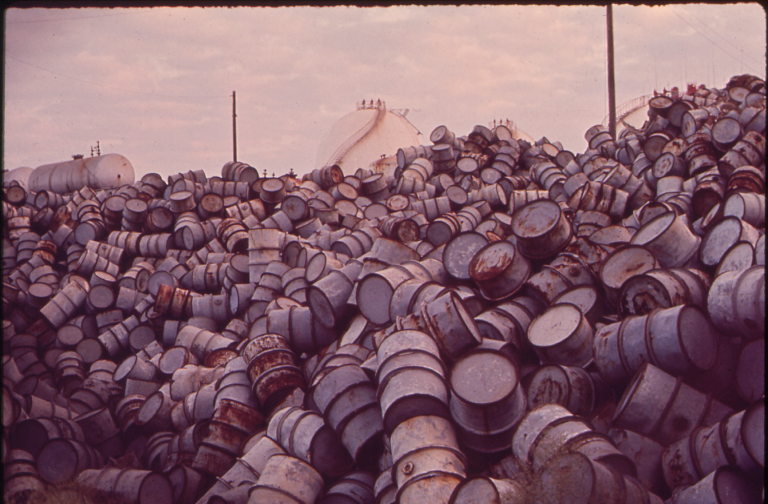If you were an oil futures trader wanting to unload a May 1 contract on Monday, April 20, a barrel of oil was worth $-37. That’s right, traders were, in effect, willing to pay someone—anyone—to take ownership of a commodity that powers modern industrial society, and has suddenly become too abundant.
The reasons for this bizarre state of affairs have been discussed at length in articles in the financial press. To summarize: the coronavirus pandemic has resulted in the grounding of fleets of airliners, while hundreds of millions of automobile owners, now under lockdown, have had to let their cars sit gathering dust rather than motoring to and fro. The result has been the quickest and deepest oil demand crash in history. In 2019, the world was using 80 million barrels of petroleum per day (mb/d); the pandemic has probably erased at least 20 mb/d of demand (we won’t know exact figures until the dust settles). OPEC and Russia have been negotiating the terms of a voluntary production cutback in order to keep prices from falling too far too fast, but an agreement remains elusive and the size of the cuts under discussion is dwarfed by the enormity of the demand blowout.
Oil storage facilities are nearly full. So, if you’re a futures trader and have to settle your May contracts in hours or minutes, what are your options?
Without storage capacity, you can’t take physical delivery of the stuff, so you will have to sell your contracts at a discount. And if lots of other futures traders are in the same boat, the size of that discount can grow to absurd levels—as it did on Monday.
It’s all simply a matter of supply and demand. Market fundamentalists say that oil trades will eventually rebalance and all will be right with the world as soon as the pandemic is under control and the global economy gets the greenlight to consume. Perhaps. But they may be missing a couple of details:
First, the oil price crash could be signaling a deflationary contraction of the economy that won’t easily be fixed. The coronavirus pandemic is an exogenous disruptor. Therefore, the usual economic recovery tactics may not work this time around (as they more-or-less did in 2008, when disruption was caused by factors endogenous to the financial system). It all depends on the nature of the virus and its interaction with human immune systems, which we are still learning about. Will infection confer immunity? Will a vaccine quickly appear? Until we know the answers to these questions, the duration of our economic time-out, and the depth of demand destruction for lots of things, including oil, will remain matters for speculation.
The oil industry may not be fixed easily. During the past decade, nearly all new sources of supply were high-cost. That’s because oil is a nonrenewable resource that we harvest using the low-hanging fruit principle, and the low-hanging fruit had already been picked throughout decades of prospecting, drilling, pumping, and burning. After the Federal Reserve patched up the financial system in 2008-2010 by showering investors with trillions of dollars of new money,
America’s frackers were able to commandeer boatloads of that cash by portraying their industry as the next “big thing.” Producing tight oil with horizontal drilling and fracking was so expensive that very few companies actually made a profit, but that pesky irrelevancy was easily swatted away. As industry reps repeated at investor presentations, “The proof is in the production!” The money poured in, and America’s oil production levels soared.
But now dozens of tight oil companies are about to be wiped out. Indeed, the entire petroleum industry is teetering. In the short term, the big fish will simply eat smaller ones, buying up assets for pennies on the dollar. But the big fish are finding themselves swimming in water that’s getting uncomfortably shallow.
Further, there’s the prospect that shutting-in wells could reduce their cumulative production by 5 to 10 percent, leading to a permanent loss of productive capacity. For all the best financial reasons, oil companies have created a fragile system, exemplified in the fact that pipelines require a certain volume of oil in order to prevent infrastructure damage.
That second detail: the importance of petroleum to industrial societies is hard to overstate.
Virtually all sectors of society depend on fossil fuels, including our food system. If U.S. oil companies fail, that means total global production will be capped at a significantly lower level, putting a limit on economic recovery. This would also make the U.S. more dependent, once again, on foreign sources of conventional oil. Renewable energy boosters might say good riddance to the frackers, but the renewable energy transition depends on fossil fuel inputs to the production of solar panels, wind turbines, and batteries. Further, the electrification of transportation will be hit hard by competition with low-priced oil.
Conceivably, the shock of seeing oil trading at $-37 could forcibly awaken us all to a broader and deeper view of the human condition in the early 21 st century. Oil is what made our modern way of life possible. It’s also what makes it unsustainable. Oil is amazing stuff, the product of tens of millions of years of sunlight captured by photosynthesis and slowly transformed by natural processes into a substance that is energy-dense, easily storable, and transportable. But burning millions of years’ worth of carbon-based fuel in a mere century is changing the chemistry of Earth’s atmosphere and oceans to such a degree that civilization may not survive.
What could future generations do with oil, other than simply burn it? What might future generations tell us about climate change?
Unfortunately, future generations don’t have a say with regard to prices. And that may be the single biggest flaw in the way we’ve organized our modern world.
Photo: A MOUNTAIN OF DAMAGED OIL DRUMS NEAR THE EXXON REFINERY (1972). John Messina EPA. Wikimedia Commons.






